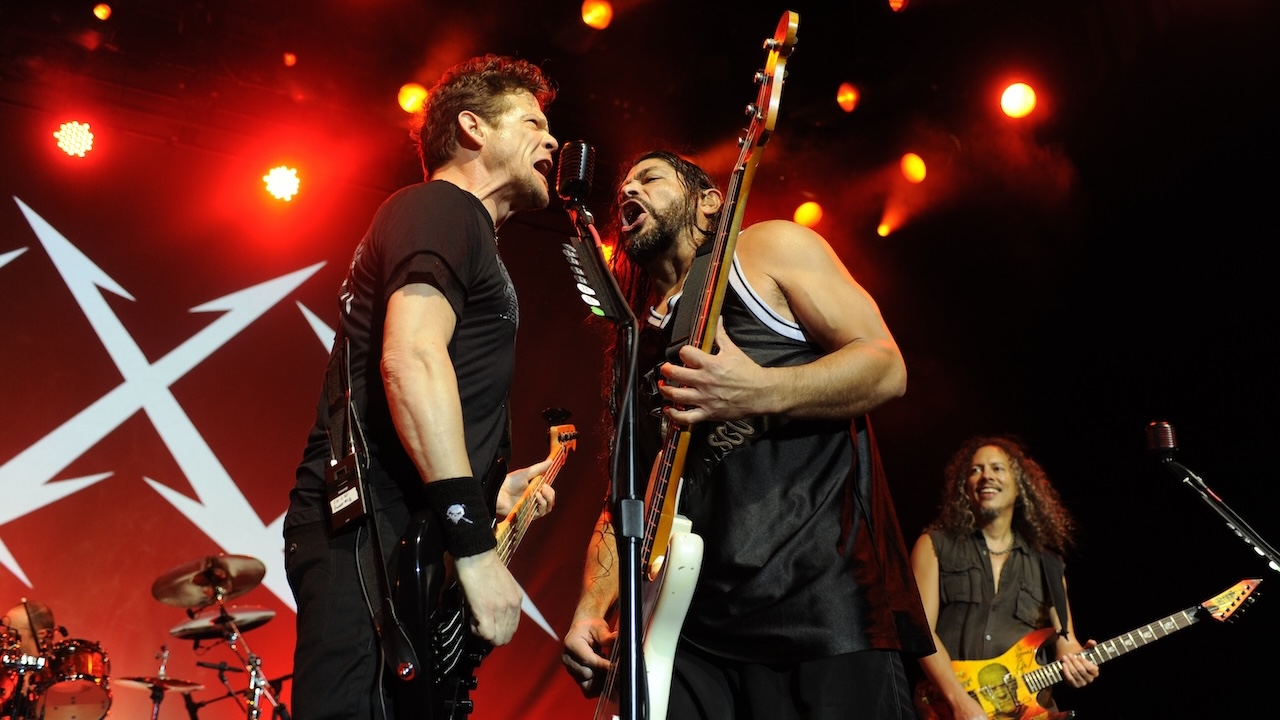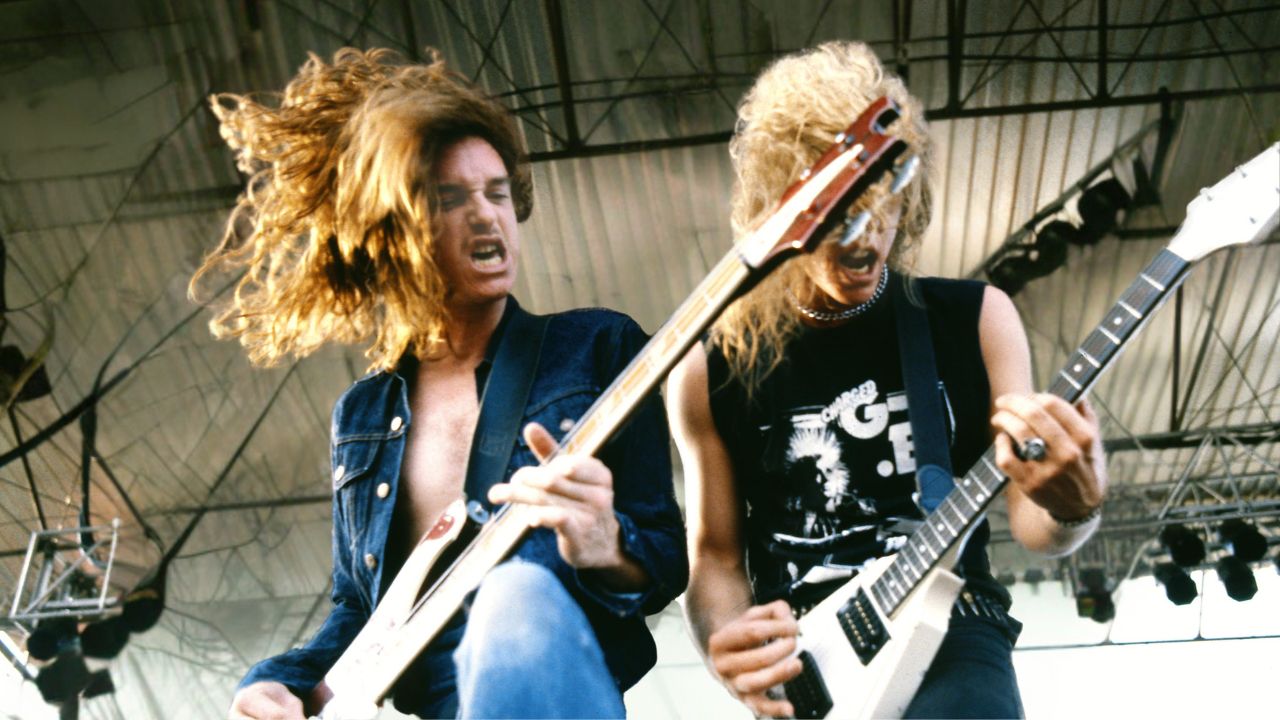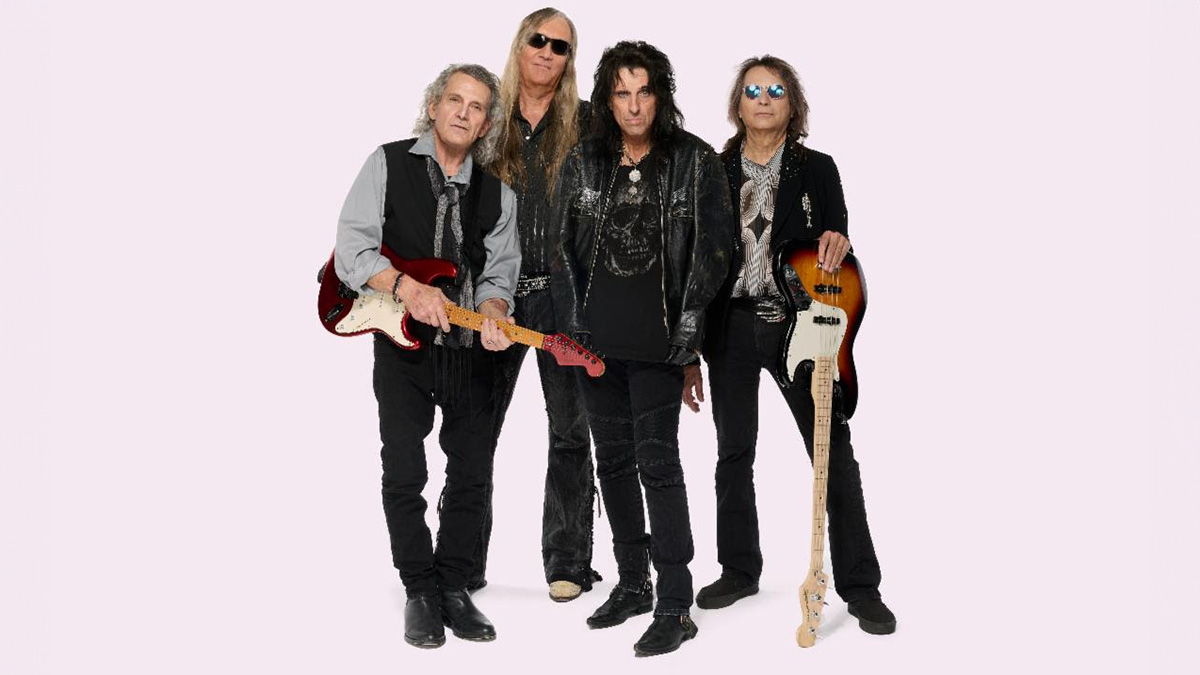“There’s an art to simplicity, and Jason Newsted brought that art. Cliff Burton was more aggressive, and a busier player”: The bassists of Metallica
From Ron McGovney to Robert Trujillo, we trace the evolution of Metallica’s low-end sound

If you know your Metallica history, you'll know that Jason Newsted and Robert Trujillo aren't the only guys to have filled the bass chair with the thrash metal giants. The first, Ron McGovney, joined in January 1982, but his time with the band was to be short-lived.
The story goes that McGovney was at a concert in San Francisco with guitarist James Hetfield and drummer Lars Ulrich when they saw Cliff Burton play with his band Trauma.
“Cliff starts going into this bass solo. And they’re just looking at him and their eyes are wide open,” McGovney told Bass Player in 2018. “I kind of knew right at that point: ‘This is the guy that they’re gonna go after.’ I could just feel it.”
Tension with guitarist Dave Mustaine eventually led McGovney to quit – he was more interested in being a motorcycle mechanic than in playing thrash metal. Burton joined in September 1982, but he always respected McGovney’s time in the band, giving him a backstage pass to a concert at the Palladium in 1984.
Burton’s impact on Metallica’s music was immense – listen to Orion from their superlative Master Of Puppets album for evidence – and on the next generation of metal bassists, all of whom owe him a debt to a greater or lesser degree.
Burton’s most famous instrument was his 1979 Rickenbacker 4001, uniquely modded with three replacement pickups: a Gibson EB, a Seymour Duncan stacked Jazz, and a Duncan Stratocaster pickup under the bridge for extra top end. It’s this bass that you can hear on Kill ’Em All and Ride The Lightning, but by the time of Master Of Puppets, he had switched to an Aria Pro II.
“Cliff’s style was very aggressive,” says Robert Trujillo, Metallica’s bass player since 2003. “When I joined Metallica, I became more familiar with where he was coming from creatively. That’s when I realized how special he was.”
Get The Pick Newsletter
All the latest guitar news, interviews, lessons, reviews, deals and more, direct to your inbox!
By 1986 Metallica were riding high, but the year was to end in tragedy. While on tour in Sweden the group's tourbus skidded and crashed. Burton was trapped under the bus and killed. He was 24 years old when he died.

It looked like Metallica had been dealt a blow from which they would never recover, but they made the decision to carry on, with Jason Newsted joining in October 1986. For his audition Newsted had learned the band's entire back catalogue. When they asked him which song he wanted to play, he replied, “Whatever song you want.”
Newsted’s stint with Metallica was commercially successful, but also creatively inconsistent. While his bass playing was always exemplary, delivered on a range of basses including his beloved Sadowsky, he was inaudible on the 1988 album ...And Justice For All, while other, less assured records such as Load and Reload divided the Metallica fanbase.
Still, 1991’s self-titled LP – the Black Album – was a massive success, selling over 30 million copies worldwide.
Metallica found a new, bottom-heavy sound thanks to Canadian producer Bob Rock. “In Bob Rock I found someone who knew what he wanted and how to achieve it,” said Newsted. “I learned a lot by listening for what he wanted in terms of bass sound. I learned to bring lots of mids up. I didn't do that before.”
As current bassist Robert Trujillo told Bass Player: “You could hear Jason’s parts better for sure, and they were a bit more delegated, but still great, though. There’s an art to simplicity, and Jason brought that art.
“Obviously Cliff was very aggressive, very melodic, and a busier player, so it’s not like one way’s better than the other, but it would be safe to say that Jason’s parts were easier for me to learn, for sure.”
After one too many disputes with the other band members Newsted called it a day, and left in January 2001.
Following Newsted's departure, Rock kept the group's album plans alive by playing all the bass guitar parts on its 2003 Elektra release, St. Anger. Rock played just three gigs with Metallica, but in the studio he became an essential part of the group's bass legacy.
“Please – tell all the bass players to be easy on me, man,” Rock told Bass Player. “I did my best to represent you well!”
Robert Trujillo – who had played with Suicidal Tendencies, Ozzy Osbourne, Black Label Society and Jerry Cantrell's solo band prior to joining – was announced as Metallica's new bassist on February 24, 2003, following a two-day try-out that was captured on their fly-on-the-wall Metallica: Some Kind of Monster rockumentary.
Bassists Pepper Keenan, Jeordie White, Scott Reeder, Eric Avery, Danny Lohner and Chris Wyse – among others – also tried out for the role, but after months of auditions, Trujillo was officially declared the new bassist.
“For the first couple of years, I was literally just hanging on,” said Trujillo. “We hadn’t even done Anesthesia until the Puppets anniversary show in 2006, so I did a lot on my own, to stay ahead of the game, because for the first three years I was chasing it.”

When we ask about his his predecessors, Trujillo reflected: “Hard shoes to fill. Both guys are incredible players. Considering Newsted's a pick player, and the speed and dexterity involved in this music, I think it's a tall order. And for Cliff too, who was a finger player.
“I'm not being disrespectful to all the bass players out there, but there aren't many bassists that could do this job. Playing with Metallica is the most demanding gig there is.”

Nick Wells was the Editor of Bass Guitar magazine from 2009 to 2011, before making strides into the world of Artist Relations with Sheldon Dingwall and Dingwall Guitars. He's also the producer of bass-centric documentaries, Walking the Changes and Beneath the Bassline, as well as Production Manager and Artist Liaison for ScottsBassLessons. In his free time, you'll find him jumping around his bedroom to Kool & The Gang while hammering the life out of his P-Bass.
You must confirm your public display name before commenting
Please logout and then login again, you will then be prompted to enter your display name.
“When I first heard his voice in my headphones, there was that moment of, ‘My God! I’m recording with David Bowie!’” Bassist Tim Lefebvre on the making of David Bowie's Lazarus
“One of the guys said, ‘Joni, there’s this weird bass player in Florida, you’d probably like him’”: How Joni Mitchell formed an unlikely partnership with Jaco Pastorius





![[from left] George Harrison with his Gretsch Country Gentleman, Norman Harris of Norman's Rare Guitars holds a gold-top Les Paul, John Fogerty with his legendary 1969 Rickenbacker](https://cdn.mos.cms.futurecdn.net/TuH3nuhn9etqjdn5sy4ntW.jpg)





